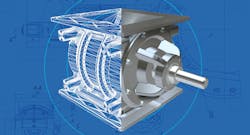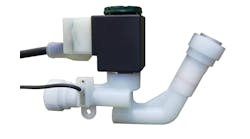Is it time to repair or replace your rotary valve? Watch out for these red flags.
By Megan Thompson
There are plenty of ways to increase the longevity of your valve. Performing regular maintenance, keeping spare parts on hand and choosing the right protective coatings are all standard options. That said, it’s normal for valves to wear down over time.
When your valve needs repairs, it will tell you — you just have to know how to read the signs. Here’s how to tell if your valve needs maintenance, repair or a full replacement.
1) It makes strange noises
If your valve sounds like an internet modem from 2002, that’s a sign repairs are in order. Take note of any moments when your valve sounds much louder than usual or makes noises you’ve never heard before.
When that happens, shut down the system and do an inspection. You may be able to identify the issue and find the solution in your valve maintenance manual. Unusual sounds can happen as a result of increased rotor clearances, so it’s worth checking them regularly to prevent this problem.
Besides that, strange noises could be related to a mechanical problem with the drive chain or drive shaft. You should also check for product buildup in the valve or jams involving a foreign object.
2) Material is leaking out
There are some issues you just can’t sweep under the rug, and leaking material is one of them. It’s a waste of money and a source of combustible dust that heightens the risk of fire in your plant. When you notice leaks coming through unsealed areas of the valve instead of going down your conveying line, it’s time to make some repairs.
Again, your rotor clearances expand over time, which causes the valve to stop sealing properly. That reduces its capacity and increases pressure around the seal area, wearing down the seals and causing material to leak.
The fix is usually to replace shaft seals or adjust rotor clearances, but that will depend on how you diagnose the issue.
3) Material is jamming
Material jams are worse than traffic jams: when too much material builds up on your conveying line, you could end up with broken chains, an overloaded motor or a rotor that keeps bending until it breaks.
That’s an expensive problem — not to mention the downtime needed for cleanup. It’s more common in applications that convey sticky or powdery materials, such as sugar and flour. These substances often stick inside the rotor in moist or humid conditions.
When material jams happen, the required repairs vary. Start by checking the supply source or the piping layout of the conveying system. Make sure the rotor is clean before you do this. You can prevent jamming by selecting the right rotors and features from the outset — and by choosing a valve on rails for super-efficient cleaning.
4) The airlock stopped rotating
If your airlock stops rotating, you may be looking at a more serious issue — for instance, a broken shaft usually means it’s time to buy a new valve altogether.
Before you go there, be thorough with your troubleshooting and diagnosis and run through all the possibilities. Lock out and tag the system first, then check for electrical issues with the motor. You could also look for a foreign object stuck in the inlet or signs of wear on the chain or gearbox. These may need to be replaced if they’re too worn down.
In the event you need a new rotary valve, it’s a good time to customize one with the right coatings, features and accessories to convey your materials efficiently. This approach increases the lifespan of your valve and reduces the need for repairs and downtime.
Ask a specialist for help
When you need help with a rotary valve problem, call a team that knows pneumatic conveying systems from top to bottom. The experts at ACS Valves will make sure you’re getting the most out of your valve.
This content is sponsored by ACS Valves. Sponsored content is authorized by the client and does not necessarily reflect the views of the Process Flow Network editorial team.



